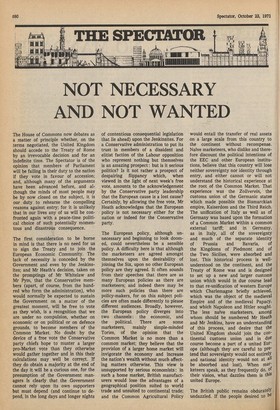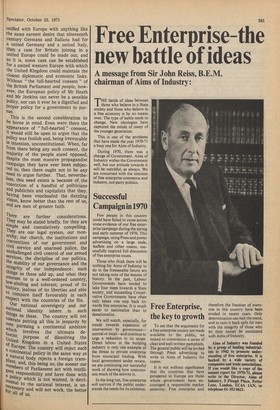NOT NECESSARY AND NOT WANTED
The House of Commons now debates as a matter of principle whether, on the terms negotiated, the United Kingdom should accede to the Treaty of Rome by an irrevocable decision and for an indefinite time. The Spectator is of the opinion that members of Parliament will be failing in their duty to the nation if they vote in favour of accession; and, although many of the arguments have been advanced before, and although the minds of most people may be by now closed on the subject, it is our duty to rehearse the compelling reasons against entry; for it is unlikely that in our lives any of us will be confronted again with a peace-time political choice of such potentially momentous and disastrous consequence.
The first consideration to be borne in mind is that there is no need for us to sign the Treaty and to join the European Economic Community. The lack of necessity is conceded by the Government and even by the Jenkinsites; and Mr Heath's decision, taken on the promptings of Mr Whitelaw and Mr Pym, that the Conservative members (apart, of course, from the hundred who form the administration), who would normally be expected to sustain the Government on a matter of the greatest moment, will be free to vote as they wish, is a recognition that we are under no compulsion, whether on economic or on political or on defence grounds, to become members of the Common Market. No doubt by the device of a free vote the Conservative party chiefs hope to muster a larger pro-Market vote than they otherwise would gather together and in this their calculations may well be correct. If they do obtain a majority at the end of the day it will be a curious one, for the presumption of the Government managers is clearly that the Government cannot rely upon its own supporters but must depend (and continue to depend, in the long days and longer nights of contentious consequential legislation that lie ahead) upon the Jenkinsites. For a Conservative administration to put its trust in members of a dissident and elitist faction of the Labour opposition who represent nothing but themselves is an amazing prospect : but is it serious politics? Is it not rather a prospect of despairing flippancy which, when viewed in the light of next week's free vote, amounts to the acknowledgement by the Conservative party leadership that the European cause is a lost cause? Certainly, by allowing the free vote, Mr Heath acknowledges that the European policy is not necessary either for the nation or indeed for the Conservative party.
The European policy, although unnecessary and beginning to look doomed, could nevertheless be a sensible policy. A difficulty here is that although the marketeers are agreed amongst themselves upon the desirability of joining the Six, upon no other European policy are they agreed. It often sounds from their speeches that there are as many European policies as there are marketeers; and indeed there may be more such policies than there are policy-makers, for on this subject policies are often made differently to please different audiences. Broadly, however, the European policy diverges into two channels : the economic, and the political. There are some marketeers, mainly simple-minded Tories, of the opinion that the Common Market is no more than a common market; they believe that the provision of a larger home market will invigorate the economy and increase the nation's wealth without much affecting matters otherwise. This view is unsupported by serious economists : in such a home market, British manufacturers would lose the advantages of a geographical position suited to world trade and unsuited to continental trade; and the Common Agricultural Policy would entail the transfer of real assets on a large scale from this country to the continent without recompense. Naive marketeers, who dislike and therefore discount the political intentions of the EEC and other European institutions, believe that this country will lose neither sovereignty nor identity through entry, and either cannot or will not understand the historical experience at the root of the Common Market. That experience was the Zollverein, the customs union of the Germanic states w,hich made possible the Bismarckian empire, Kaiserdom and the Third Reich. The unification of Italy as well as of Germany was based upon the formation of a Common Market within a common external tariff; and in Germany, as in Italy, all of the sovereignty and much of the separate identity of Prussia and Bavaria, of the Kingdoms of Piedmont and of the Two Sicilies, were absorbed and lost. This historical process is wellunderstood on the continent, and the Treaty of Rome was and is designed to set up a new and larger customs union which would in due course lead to that re-unification of western Europe which Charlemagne briefly achieved, which was the object of the medieval Empire and of the medieval Papacy, and which Napoleon and Hitler sought. The less naive marketeers, among whom should be numbered Mr Heath and Mr Jenkins, have an understanding of this process, and desire that the United Kingdom should join the continental customs union and in due course become a part of a united Europe (although they are careful to Pre' tend that sovereignty would not entirelY and national identity would not at an be absorbed and lost). When marketeers speak, as they frequently do, 0.f their vision, what dazzles them is this united Europe.
The British public remains obduratelY undazzled. If the people desired to be unified with Europe with anything like the same earnest desire that nineteenth century Germans and Italians had for a united Germany and a united Italy, then a case for Britain joining in a united Europe could be made out; and as it is, some case can be established for a united western Europe with which the United Kingdom could maintain the closest diplomatic and economic links. Without "the full-hearted consent" of the British Parliament and people, however, the European policy of Mr Heath and Mr Jenkins can never be a sensible Policy, nor can it ever be a dignified and Proper policy for a government to pursue.
This is the second consideration to be borne in mind. Even were there the appearance of " full-hearted " consent, It would still be open to argue that the Policy was foolish and, being irrevocable m intention, unconstitutional. When, far from there being any such consent, the Majority of the people stand opposed, despite the most massive propagandist campaign they have ever been subjected to, then there ought not to be any need to argue further. That, nevertheless, this need exists is because of the conviction of a handful of politicians and publicists and capitalists that they, having been vouchsafed the dazzling vision, know better than the rest of us, and are men of greater faith.
There are further considerations. They may be stated briefly, for they are simple and cumulatively compelling. They are our legal system, our monarchy, our church, the institutions and conventions of our government and civil service and unarmed police, the unchallenged civil control of our armed services, the discipline of our politics, stability of our governance and the integrity of our independence : such things as these add up, and what they amount to is a well-ordered country, law-abiding and tolerant, proud of its history, jealous of its liberties and able to compare itself favourably in each 'esPect with the countries of the Six. Our national sovereignty and our national identity inhere in such tinngs as these. The country will not tolerate putting all this in jeopardy by inen pursuing a continental ambition l'_vhich involves the ultimate defeatist purpose of dissolving the United Kingdom in a United States of Europe. The country will reject such a continental policy in the same way as a nat body rejects a foreign transPlant;ural and, this being so, the sooner our Inernbers of Parliament act with intelligent responsibility and have done with P°1icY which is not wanted, is detri. ental to the national interest, is un:ecessary and will not work, the better Or all of us.



































 Previous page
Previous page